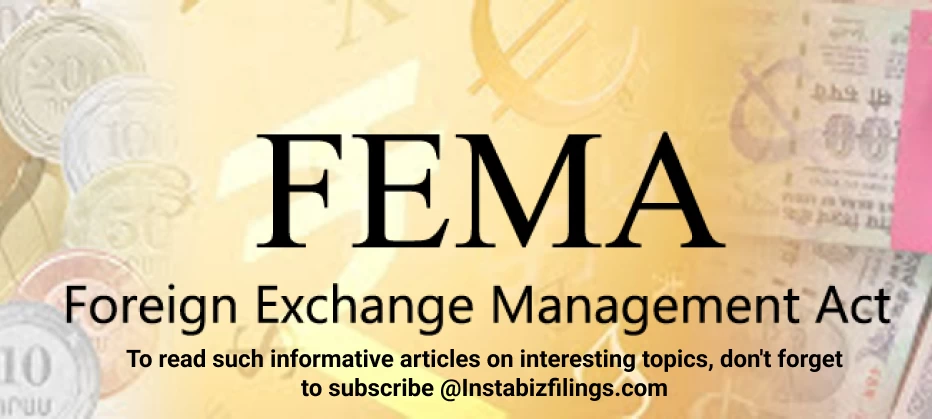
FEMA (Foreign Exchange Management Act)
August 20, 2025 by Team Instabizfilings
One of the major pieces of legislation that controls the foreign exchange and foreign transactions in India is the Foreign Exchange Management Act (FEMA) enacted in the year 1999. It superseded the Foreign Exchange Regulation Act (FERA), 1973 to realize a more liberal and transparent regime which reflected the change towards globalization and economic liberalization by India.
FEMA replaced the Foreign Exchange Regulation Act, 1973, and was brought to effect on June 1, 2000, and it is operated under the Reserve Bank of India (RBI) and the Enforcement Directorate (ED).
Objective of FEMA
The main aims of FEMA are:
-
To support the external trade and payments.
-
To facilitate controlling and development of foreign exchange market in India.
-
To facilitate the adequate control of the foreign exchange dealings between India and other countries.
Key Features of FEMA
-
De-criminalization of Offenses : The offense under FEMA is treated as a civil offense (not criminal as was the case under FERA) and thus the law is now more friendly to the investor.
-
Liberal Approach : In the case of FEMA, the current account transactions are permitted free of restrictions and the transactions of capital accounts have to be approved either by RBI or the Government.
-
Central Control : RBI has the regulation of the foreign exchange under the FEMA and the Enforcement Directorate (ED) will investigate any irregularities.
-
Resident vs Non-resident Status : A person who is resident in India according to FEMA is one who has been present in India physically for more than 182 days in the previous financial year.
Scope and Applicability
-
All branches, offices and agencies abroad owned or controlled by a person resident in India.
-
All foreign exchange, foreign security, and foreign transactions including:
- Foreign investments
- Exports and imports
- Acquisition of property abroad
- Repatriation of foreign income
Types of Transactions under FEMA
|
Transaction Type |
Explanation |
|
Current Account Transactions |
Day-to-day transactions like remittances for travel, education, medical expenses, etc. Generally permitted unless specifically restricted. |
|
Capital Account Transactions |
Transactions that alter assets or liabilities, such as foreign investments, real estate purchases, or loans across borders. Regulated by the RBI. |
Authorities Under FEMA
|
Authority |
Role |
|
RBI |
Main regulator for all foreign exchange-related activities. |
|
Central Government |
Frame rules and policies under FEMA. |
|
Enforcement Directorate (ED) |
Investigates and prosecutes violations. |
|
Adjudicating Authority |
Decides on penalties for non-compliance. |
Key Provisions
-
Section 3: This disallows commerce in the exchange of foreign money except by authorised individuals.
-
Section 4: Prohibition to possess foreign exchange without prior authorisation by FEMA.
-
Section 5: Enables the current account transactions to take place quite freely, restricted by the Central Government.
-
Section 6: Regulates the authorisation of RBI on the transactions of capital accounts.
-
Section 13: Lays set penalties on contravention.
Penalties under FEMA
Under FEMA, violations may result in:
-
Monetary Penalty: A maximum of three times of what was involved in the violation.
-
Confiscation: Of any currency, security or property, with regards to the breach.
-
Compounding: The offenders have the option to seek compounding in order to avert the law suit and make the matter close.
Differences Between FEMA and FERA
|
Aspect |
FERA (1973) |
FEMA (1999) |
|
Nature |
Criminal Law |
Civil Law |
|
Objective |
Control foreign exchange |
Manage and facilitate foreign exchange |
|
Approach |
Conservative and strict |
Liberal and open |
|
Penalties |
Imprisonment |
Monetary fines |
|
Implementation |
Presumption of guilt |
Presumption of innocence |
Importance of FEMA in India’s Economy
-
Open to foreign investment and improve business execution.
-
Helps in world trade with its stability in terms of transaction.
-
Makes it financially secure by putting off illicit dealings such as money laundering and hawala.
-
Brings India to the global financial standards.
Recent Developments and Amendments
-
The RBI ensures that FEMA regulations are updated periodically according to the changing economic and investment scenarios.
-
It permitted the introduction of the Liberalised Remittance Scheme (LRS) under which an individual will be allowed to remit up to USD 250,000 per year to a foreign country.
-
The external commercial borrowings (ECBs) and the overseas direct investments (ODI) were also strapped with stern measures.
Conclusion
FEMA, which means the Foreign Exchange Management Act, is an updated liberalized foreign exchange regime in India. It is also an important part of the Indian path in development as a world economic player as it promotes cross trades and foreign investment and money transparency. Awareness on FEMA is crucial to all businesses, investors and individuals in order to remain in synchronisation with the regulations and to explore the possibilities in the globalised economy.
Disclaimer
The information provided in this blog is purely for general informational purposes only. While every effort has been made to ensure the accuracy, reliability and completeness of the content presented, we make no representations or warranties of any kind, express or implied, for the same.
We expressly disclaim any and all liability for any loss, damage or injury arising from or in connection with the use of or reliance on this information. This includes, but is not limited to, any direct, indirect, incidental, consequential or punitive damage.
Further, we reserve the right to make changes to the content at any time without prior notice. For specific advice tailored to your situation, we request you to get in touch with us.

Need more details? We can help! Talk to our experts now!
Start Your Business Registration – Talk to Our Experts Now!

Still Confused?
Talk to experts? Fill in the information and we will reach out in 24 Working Hours.

